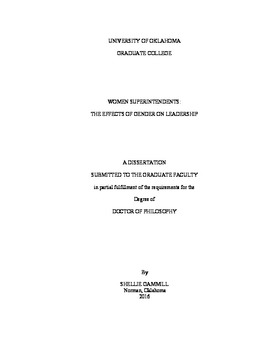| dc.contributor.advisor | Maiden, Jeffery | |
| dc.contributor.author | Gammill, Shellie | |
| dc.date.accessioned | 2016-11-11T14:17:37Z | |
| dc.date.available | 2016-11-11T14:17:37Z | |
| dc.date.issued | 2016-12 | |
| dc.identifier.uri | https://hdl.handle.net/11244/46274 | |
| dc.description.abstract | The superintendency is one of the most heavily masculinized roles in American culture (Brunner & Grogan, 2007). It is documented that women are underrepresented in the position of superintendency. Approximately 20% of the superintendents are women with the percentage being much lower in some regions (Blount, 1998; Brunner, 2000; Glass, 2000; Shakeshaft, 1989). Qualified women are having a difficult time getting an interview for the open positions, much less a position as a superintendent. There are a multitude of issues according to literature that stands in the way of women following the path toward administration. This study was conducted in order to examine one of the pieces that could contribute to the research about women and the way they lead.
The purpose of this qualitative research study is to explore the relationship between gender and the leadership styles utilized by women superintendents. This study primarily serves as an educative instrument by sharing the lived experiences of women superintendents. The interpretive paradigm, hermeneutic phenomenology, was selected because of the potential to generate new understandings of complex multidimensional human phenomena. Ten women superintendents who could illuminate the phenomena were interviewed and themes were pulled out to help answer the question if gender affects the leadership style that women use and if that contributes to their success as a leader.
A series of interviews, journal notes, audio-recordings, and transcriptions were used to collect the data for this interpretive phenomenological study. van Manen’s (1990, 2014) phenomenological methodology provides an overlay with which to understand the participants’ existential lifeworlds. The research project used existing themes of relationships, power, self-esteem with eleven common leadership theories to explore the experiences of women superintendents.
The findings indicate that women continue to battle sexism to obtain and maintain successful employment as district superintendent. Stakeholders continue to believe and express opinions that women are not fiscally responsible or capable of being the instructional leader of their local districts. Women are routinely questioned privately and publicly about their qualifications and decisions. The significance of the study calls for future research to enrich the understanding of how women have navigated the challenges to successfully lead school districts. Additional voices of women superintendents with experiences in a wide variety of setting need to be conducted. | en_US |
| dc.language | en_US | en_US |
| dc.subject | Women, Superintendents, Hermeneutic Phenomenology | en_US |
| dc.title | Women Superintendents: The Effects of Gender on Leadership | en_US |
| dc.contributor.committeeMember | Vaughn, Courtney | |
| dc.contributor.committeeMember | Pasque, Penny | |
| dc.contributor.committeeMember | Houser, Neil | |
| dc.contributor.committeeMember | Jones, John | |
| dc.date.manuscript | 2016-10 | |
| dc.thesis.degree | Ph.D. | en_US |
| ou.group | Jeannine Rainbolt College of Education::Department of Educational Leadership and Policy Studies | en_US |
| shareok.nativefileaccess | restricted | en_US |
